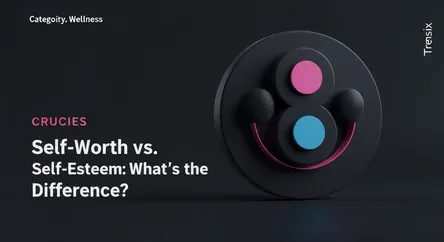Wellness
Self-Worth vs. Self-Esteem: What's the Difference?

Understand the crucial difference between self-worth and self-esteem and why focusing on the right one is key for your mental and emotional well-being.
What is it?
Self-worth and self-esteem are often used interchangeably, but they represent different aspects of how we view ourselves. Self-worth is the intrinsic, stable belief that you are valuable and worthy of love and respect simply because you exist. It's an internal sense of being good enough that is not dependent on external factors.
Self-esteem, on the other hand, is how you feel about yourself based on your accomplishments, abilities, and the approval of others. It's more of an evaluation of your qualities and can fluctuate based on successes, failures, and external feedback. While you can have high self-esteem from being good at something, you might still struggle with a low sense of self-worth.
Why is it trending?
The distinction between these two concepts is gaining traction in wellness and mindfulness circles. There's a growing recognition that the constant pursuit of high self-esteem can be a fragile and stressful endeavor. Chasing external validation can lead to anxiety, self-doubt, and imposter syndrome when that validation is absent. The conversation is shifting towards cultivating self-worth as a more stable foundation for mental health. This focus on internal value aligns with mindfulness practices that encourage self-acceptance and compassion, moving away from comparison and judgment.
How does it affect people?
Understanding this difference profoundly impacts mental and emotional health. A strong sense of self-worth acts as a buffer against life's challenges, fostering resilience and lower levels of depression. When you have a solid foundation of self-worth, a failure or criticism might hurt your self-esteem temporarily, but it doesn't shake your core belief in your own value. Conversely, basing your value solely on self-esteem can be detrimental. When your sense of self is tied to external achievements, setbacks can lead to feelings of worthlessness and contribute to anxiety and depression. Cultivating self-worth is essential for building a resilient, balanced, and healthy self-image.